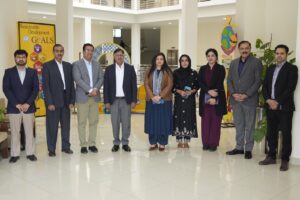Sharjah gifts Historical Corpus of the Arabic Language to Hankuk University

Seoul, The Gulf Observer: As per the directive of H.H. Dr. Sheikh Sultan bin Muhammad Al Qasimi, Supreme Council Member and Ruler of Sharjah, Ahmed bin Rakkad Al Ameri, CEO of Sharjah Book Authority (SBA), has presented the completed volumes of the Historical Corpus of the Arabic Language – the world’s first and most comprehensive collection that chronicles 17 centuries of development in the Arabic language – to the Institute of Arab Studies at Hankuk University of Foreign Studies founded in Seoul in 1954.
This gift from Sharjah is a vital and valuable source of knowledge that students, researchers, literary, linguists and academic experts in South Korea will have access to as they pursue their exploratory journeys and specialisations in language, literature, and ancient and contemporary arts of the Arab region.
As part of Sharjah’s participation as the Guest of Honour at the 65th Seoul International Book Fair, the historical corpus was presented to the university officials during a visit to the academic institution. During the visit, Al Ameri engaged with the various university heads, and held key dialogues with Yu Dal Seung, the University’s Director and Head of the Persian Studies Department; Jae Won, former director; and Professor Nabeela Eun Kyeong, Head of the Arabic Language Department at the university.
Together, the Emirati and South Korean officials discussed the importance of the Arabic language, the efforts of Sharjah, and the initiatives of the Ruler of Sharjah, in promoting Arabic language knowledge production and delivering it to the largest number of those interested in it.
Al Ameri also presented a translated copy of the autobiographical work by The Sharjah Ruler Sard Al That (My Early Life) to the President of Hankuk University to enrich the library at their Institute of Arab Studies. A detailed and compelling telling of the life story of Sharjah’s visionary ruler, that recounts the historical events from the early years to the 1970s that shaped His Highness’s life and work and also the realities of the UAE and the wider region, the book serves as an additional source of knowledge that will further enrich research activities carried out at the university pertaining to the UAE, GCC and wider Arab world.
Expressing his gratitude to H.H, the University’s Director, Yu Dal Seung, has described the historical corpus as an invaluable qualitative addition to the existing resources in the field currently available anywhere in the world, asserting that its availability at the university presents a great new opportunity to Korean specialists to deepen their understanding of Arab culture. He praised Sharjah’s role in bridging communication between Emirati, Arab and global cultures, recognising the emirate as a model for leading cities that invest in culture and leverage the power of books to build communities and achieve comprehensive and sustainable development.
For her part, Nabeela Eun Kyeong, emphasised that Sharjah is the primary capital of Arab culture for South Korea and those involved in cultural and academic affairs. Having visited Sharjah multiple times, she has been deeply inspired by the level of involvement of His Highness Sheikh Dr. Sultan Al Qasimi in preserving, developing and promoting Arabic language and culture.
“I have received an unprecedented reception by Sharjah and have seen the emirate’s leading efforts and initiatives to open and develop channels of exchange between academic and knowledge institutions interested in Arabic language and culture worldwide. The emirate, with its institutes, universities and libraries, never wavers in its commitment to promote culture and provide a space for constructive dialogue and fruitful communication with world civilisations”, she added, further emphasising that Sharjah is a global model for knowledge capitals and creative production.
This is evident in the gift of the Historical Corpus of the Arabic Language to the Center for Arab Studies at Hankuk University, which serves as a gateway to deepen the Korean Republic’s understanding and study of the Arabic language, knowledge, and creativity.


